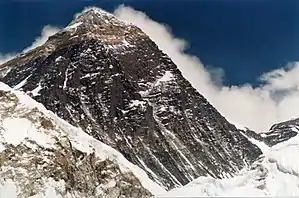Sungdare Sherpa
Sungdare Sherpa (Nepali: सुन्दरे शेर्पा) born Thame village, Solukhumbu, Nepal was a Nepalese Sherpa guide for climbers of Mount Everest, who summited Everest on five different climbs. He was the first person to summit Mount Everest three times.[1]

Summit with Hannelore Schmatz
Sungdare was with Hannelore Schmatz when she died on a 1979 expedition.[2] He remained with her after she died, and as a result, lost most of his fingers and toes to frostbite.[3]
Despite losing his digits, Sungdare summitted Mount Everest four more times after the 1979 expedition.[4]
Death
Sungdare drowned in a river below his village, Pangboche, Nepal in 1989.[5]
Elizabeth Hawley stated that he was suffering from alcoholism, and that his death was a suicide.[6] He was survived by his widow, Bhingfuti.[5]
As quoted in an article in Backpacker magazine talking about Mount Everest:[7]
The Summit is always different. Sometimes it is one side and sometimes the other. It changes every time.
— Sungdare Sherpa, 1986[7]
Everest summitings
See also
References
- "A commemorative postage stamp on Sundare Sherpa, a Nepalese Sherpa-guide for Mount Everest".
- Waterman, Jonathan (1998). In the Shadow of Denali: Life and Death on Alaska's Mt. McKinley - Google Books. ISBN 9781558217263. Retrieved 2013-10-17.
- "The Alpine Club" (PDF). Alpine-club.org.uk. Archived from the original (PDF) on 2012-03-09. Retrieved 2013-10-17.
- Adams, Vincanne (1996). Tigers of the Snow and Other Virtual Sherpas: An Ethnography of Himalayan ... - Vincanne Adams - Google Books. ISBN 0691001111. Retrieved 2013-10-17.
- McDonald, Bernadette (October 2012). Keeper of the Mountains: The Elizabeth Hawley Story - Bernadette McDonald - Google Books. ISBN 9781927330159. Retrieved 2013-10-17.
- The Backpacker - May 1986 (Google Books link)
- Everest 80s to 85